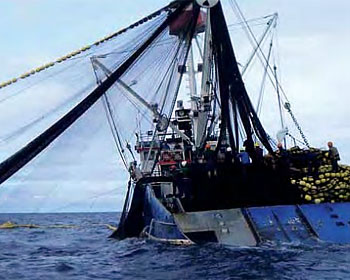|

Tuna vessel. (Photo: Anfaco)
Third country flagged tuna vessels to abide European controls
 SPAIN
SPAIN
Wednesday, April 30, 2014, 23:50 (GMT + 9)
The Government and the Spanish Fisheries Confederation (CEPESCA) signed an intention covenant in order to provide greater transparency, improve monitoring and establish greater control over the third country flagged fishing fleet activities.
This protocol was signed by the General Secretariat of Fisheries of the Ministry of Agriculture, Food and Environment (MAGRAMA) and CEPESCA on behalf of the National Association of Tuna Freezer Ship Owners (ANABAC) and the Organization of Ship Owner Producers of Big Tuna Freezer Vessels (OPAGAC).
CEPESCA stressed that this agreement "is another step in the strategy of the tuna sector to ensure the sustainability of an industry that directly or indirectly employs more than 43,000 people in Spain and is the main survival means for 200,000 people in Latin America and over 300,000 in Africa."
The tuna companies associated to CEPESCA voluntarily commit to equate the control system applied to the Spanish fleet to facilitate satellite monitoring of their third country flagged vessels and submit their positions in real time through the tracking systems.
Both the Government and the Spanish tuna fleet intend to completely monitor the boat activity.
In addition, ship owners will provide a copy of the available fishing licenses in third countries’ waters of their flagged vessels as well as its validation.
In addition, they will have to provide all the information deemed appropriate to ensure the transparency of the activity: copy of the fishing logbooks and landing or transhipment declaration, among other data.
The General Secretariat of Fisheries will analyze the information received from operators and after analyzing it, it will make a risk analysis in order to ensure the adequate fishing boats.
CEPESCA states that this protocol will make it easier for products to be landed at national ports with the same level of control and quality required from vessels from Spain.
Meanwhile, the head of the Secretariat, Carlos Dominguez, stressed that "the fishing fleet has been the first one to be subjected to the control and validation of private licenses through diplomatic channels as well as the commitment to make payments to the public treasury of the countries where they have these licenses."
He also said "it was the first to offer to subject its foreign flagged vessels to the same controls to which the Spanish fleet is subjected in terms of license verification, satellite position and electronic onboard log," the official added.
Meanwhile, Javier Garat, CEPESCA secretary general highlighted the industry's commitment to transparency and its efforts to strengthen compliance with the European standards.
Related article:
- Tuna industry advocates maintaining current tariff system
By Analia Murias
[email protected]
www.seafood.media
Photo Courtesy of FIS Member  ANFACO-CYTMA - Asociacion Nacional de Fabricantes de Conservas de Pescados y Mariscos (formerly ANFACO-CECOPESCA) ANFACO-CYTMA - Asociacion Nacional de Fabricantes de Conservas de Pescados y Mariscos (formerly ANFACO-CECOPESCA)
|



